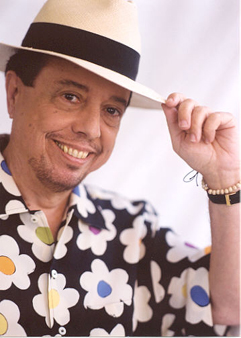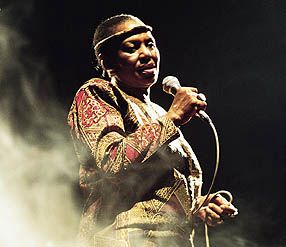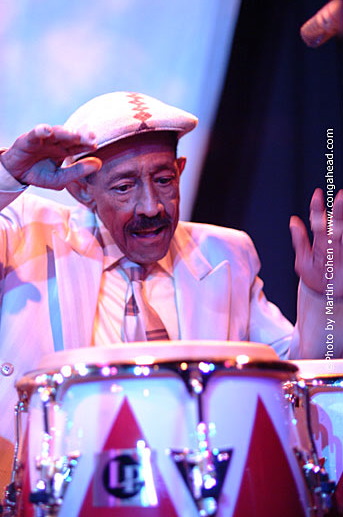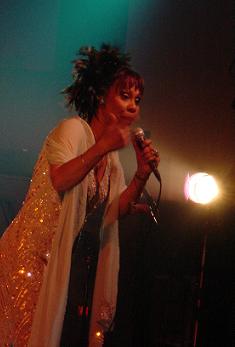SERGIO MENDES / “Mais Que Nada”
Even though they don’t play commercials during soccer games (except at halftime, of course), if you watched any significant amount of World Cup this year, you couldn’t avoid seeing Nike’s Brazil soccer team commercial. Watching Ronaldinho, Ronaldo and the rest of Brazil’s finest juggle that soccer ball like a yo-yo, shooting each other casual no-look passes and bouncing the ball all over the locker room all without ever touching it with their hands, I was mesmerized. One of the best things about the commercial is that the Brazilian athletes are obviously having fun. In America, it’s considered cool to look pissed off. That’s all well and good—I’m not going to get into a dissertation about the public persona of the black male athlete in America or any of that blah blah blah. I will say this though: in Brazil, it’s evidently possible to be young, male, black, rich, in the public eye and happy all at the same time. The music accompanying those smiling, soccer ball-juggling black Brazilians was a very hot cover version of “Mas Que Nada.” I recognized the song right away, but I didn’t know who’d done the remake. When I found out that it was The Black Eyed Peas with Sergio Mendes, I was shocked. Given that the best reaction I’ve ever had to a Black Eyed Peas song is ambivalence, I never imagined that I’d find myself getting hype every time I heard a song of theirs. In any event, that commercial got me thinking. I remembered Kalamu mentioning Miriam Makeba’s version of “Mas Que Nada” back in August of ’05. Not to mention that damn near every Brazilian compilation I buy seems to include a version of the tune. So I decided to find out a little more about the song’s history.
 First things first. Although I’ve repeatedly seen references to “the Sergio Mendes classic ‘Mas Que Nada,’” the composer and original performer of the song is actually Brazilian legend Jorge Ben. In Brazil, Ben’s version is still considered the standard. In America, I would think, more people know Mendes’ version. But Ben’s is the original and sounds like it. Both the drummer and the guitarist play in a light-handed, archaic style that was virtually obligatory in 1963, but forty-some years later, simply isn’t heard anymore. As for Ben’s vocals, if you know any of his music, you’ll recognize him here. The quivering half-yodel thing he does on extended notes; the silver-tongued grace he uses to navigate the Portuguesian jumbles of vowels and sibilants—he sounds both as good and as distinctive as he ever did.
First things first. Although I’ve repeatedly seen references to “the Sergio Mendes classic ‘Mas Que Nada,’” the composer and original performer of the song is actually Brazilian legend Jorge Ben. In Brazil, Ben’s version is still considered the standard. In America, I would think, more people know Mendes’ version. But Ben’s is the original and sounds like it. Both the drummer and the guitarist play in a light-handed, archaic style that was virtually obligatory in 1963, but forty-some years later, simply isn’t heard anymore. As for Ben’s vocals, if you know any of his music, you’ll recognize him here. The quivering half-yodel thing he does on extended notes; the silver-tongued grace he uses to navigate the Portuguesian jumbles of vowels and sibilants—he sounds both as good and as distinctive as he ever did.
 I won’t make the claim that Sergio Mendes’ 1966 version is better than Ben’s original, but it’s certainly more dramatic. Mendes’ decision (I assume it was his) to do Ben’s ‘OOOHHH-OH-OH-OH!’ with a chorus instead of a single voice changes the feel of the song completely. Add in the rollicking piano line that many (including me) instantly think of whenever they hear the song title, and voila! Classic material. Though not perfect. Somewhere hidden in the groove of Mendes’ “Mais Que Nada” is a poppy, overly-pleasant undertone that suggests Mendes knew (or at least hoped) the song was going to hit big. I have to say too, I wasn’t surprised when I found out that the lead vocals are performed not by a Brazilian, but by an American singer, Lani Hall, who had to learn the Portuguese lyrics phonetically. Mendes’ cover dropped just three years after Ben’s original and in Brazil, Ben’s version was already well known. Still, it was Mendes’ version that most non-Brazilians heard first. “Mais Que Nada” (presumambly, the ‘mais’ spelling is to distinguish the Portuguese pronunciation of ‘mas’ from the more familiar Spanish pronunciation) hit big all over the world, making the young pianist and arranger an international star. In America, Mendes’ “Mas Que Nada” became a Top Five Adult Contemporary hit.
In the wake of Ben’s and Mendes’ success with the song, countless Brazilian singers and players have recorded cover versions and we’re including a random sampling here. I make no claims to know which versions are better known or more influential either in America or in Brazil or anywhere else. I’m making these selections based on liking to listen to them and little else.
I won’t make the claim that Sergio Mendes’ 1966 version is better than Ben’s original, but it’s certainly more dramatic. Mendes’ decision (I assume it was his) to do Ben’s ‘OOOHHH-OH-OH-OH!’ with a chorus instead of a single voice changes the feel of the song completely. Add in the rollicking piano line that many (including me) instantly think of whenever they hear the song title, and voila! Classic material. Though not perfect. Somewhere hidden in the groove of Mendes’ “Mais Que Nada” is a poppy, overly-pleasant undertone that suggests Mendes knew (or at least hoped) the song was going to hit big. I have to say too, I wasn’t surprised when I found out that the lead vocals are performed not by a Brazilian, but by an American singer, Lani Hall, who had to learn the Portuguese lyrics phonetically. Mendes’ cover dropped just three years after Ben’s original and in Brazil, Ben’s version was already well known. Still, it was Mendes’ version that most non-Brazilians heard first. “Mais Que Nada” (presumambly, the ‘mais’ spelling is to distinguish the Portuguese pronunciation of ‘mas’ from the more familiar Spanish pronunciation) hit big all over the world, making the young pianist and arranger an international star. In America, Mendes’ “Mas Que Nada” became a Top Five Adult Contemporary hit.
In the wake of Ben’s and Mendes’ success with the song, countless Brazilian singers and players have recorded cover versions and we’re including a random sampling here. I make no claims to know which versions are better known or more influential either in America or in Brazil or anywhere else. I’m making these selections based on liking to listen to them and little else.
 My favorite two Brazilian versions (other than Ben’s and Mendes’, of course) are by Elza Soares and The Tamba Trio. Rio de Janeiro native Elza Soares has been performing ever since the late '50s, but she first gained popularity as a bossa nova vocalist. Soares recorded her cover of “Mas Que Nada” in 1970, but both the horns and Soares’ vocals have the same sophisticated ease that most classic bossa does, a sound that suggests lazing about on sun-drenched porches or sandy beaches. Tamba Trio’s cover is apparently one of the better-known versions. I like it because it’s different. It distinguishes itself from the pack with a slower pace and with multiple voices on the lead vocal as opposed to just the chorus. There’s also none of the samba-esque swing that many versions use. Tamba’s rhythm is more both more deliberate and consistent, sounding almost like a march.
My favorite two Brazilian versions (other than Ben’s and Mendes’, of course) are by Elza Soares and The Tamba Trio. Rio de Janeiro native Elza Soares has been performing ever since the late '50s, but she first gained popularity as a bossa nova vocalist. Soares recorded her cover of “Mas Que Nada” in 1970, but both the horns and Soares’ vocals have the same sophisticated ease that most classic bossa does, a sound that suggests lazing about on sun-drenched porches or sandy beaches. Tamba Trio’s cover is apparently one of the better-known versions. I like it because it’s different. It distinguishes itself from the pack with a slower pace and with multiple voices on the lead vocal as opposed to just the chorus. There’s also none of the samba-esque swing that many versions use. Tamba’s rhythm is more both more deliberate and consistent, sounding almost like a march.
 When it comes to the non-Brazilians, Miriam Makeba’s cover (which Kalamu mentioned several months ago) is easily the most soulful. The faster you play “Mas Que Nada,” the more kitschy it sounds—Makeba’s band gets it right by playing it slow. They dig deep, past the skin, past even the meat—they get right down to the bone, to the skeletal, essential structure of the song. Makeba hears the African retentions in Ben’s light, pop-inflected rhythms. In this case, ‘Mama Africa’ is an excavator—removing years of flash and pop and glitz to expose the warm, classic glow of the original.
I have to include a couple of jazz versions. Oscar Peterson’s version is exuberance itself. For me, the speed of Peterson’s piano runs mixed with the pounding of the congas is suggestive of New Orleans street music. It’s both funky and virtuostic, wild and wily. The only bad thing I can say about it is—at two-and-a-half minutes in length—it’s way too short. There is also an Al Jarreau version that I like. I don’t love it though, and that’s for the same reason that I don’t love Jarreau as a performer in general. Jarreau's strengths are well known: he has a unique vocal style, improvisational expertise and a strong sense of melodic creativity. Unfortunately, he has some major deficiencies as well: too frequently he panders to the mainstream consumer, trying to sell records to people who really don't care about his vocal chops, so long as he sings something they recognize. In this case though, Jarreau's performance is a winner.
Even after my crash course on the history of “Mas Que Nada” and the various versions of the tune, I was still left with a question. What does the title mean? The answer, it seems, would depend not only on who you ask, but also on what you mean by the word ‘mean.’ Let me explain. Translated literally, “Mas que nada” would appear to mean, “But that’s nothing.” Figuratively, I’ve seen it translated numerous ways, including “No way, man!” “Oh, come on” and “What a nuisance.” There seems to be some confusion however—particularly among Spanish-speaking fans—because the Spanish phrase “mas que nada” means “more than nothing.” Apparently though, “mas” in Portuguese means “but,” not “more.” (Which may explain why Mendes changed the ‘mas’ to ‘mais.’) So in this case, the Spanish speakers are wrong. The simplest translation may be the most accurate—a few sources (who seem fluent in Brazilian Portuguese) say that “Mas que nada” is the equivalent of the sarcastic English-language rejoinder, “Yeah, right.”
I’ll leave the final word to Daniel Soares, a Brazilian music fan (meaning a music fan from Brazil, not a fan of Brazilian music) who took the time to not only translate a bit of the lyrics, but also to provide that all-important context. In the comments section of a music blog named The Pop View, Daniel wrote:
Ben means something like:
When it comes to the non-Brazilians, Miriam Makeba’s cover (which Kalamu mentioned several months ago) is easily the most soulful. The faster you play “Mas Que Nada,” the more kitschy it sounds—Makeba’s band gets it right by playing it slow. They dig deep, past the skin, past even the meat—they get right down to the bone, to the skeletal, essential structure of the song. Makeba hears the African retentions in Ben’s light, pop-inflected rhythms. In this case, ‘Mama Africa’ is an excavator—removing years of flash and pop and glitz to expose the warm, classic glow of the original.
I have to include a couple of jazz versions. Oscar Peterson’s version is exuberance itself. For me, the speed of Peterson’s piano runs mixed with the pounding of the congas is suggestive of New Orleans street music. It’s both funky and virtuostic, wild and wily. The only bad thing I can say about it is—at two-and-a-half minutes in length—it’s way too short. There is also an Al Jarreau version that I like. I don’t love it though, and that’s for the same reason that I don’t love Jarreau as a performer in general. Jarreau's strengths are well known: he has a unique vocal style, improvisational expertise and a strong sense of melodic creativity. Unfortunately, he has some major deficiencies as well: too frequently he panders to the mainstream consumer, trying to sell records to people who really don't care about his vocal chops, so long as he sings something they recognize. In this case though, Jarreau's performance is a winner.
Even after my crash course on the history of “Mas Que Nada” and the various versions of the tune, I was still left with a question. What does the title mean? The answer, it seems, would depend not only on who you ask, but also on what you mean by the word ‘mean.’ Let me explain. Translated literally, “Mas que nada” would appear to mean, “But that’s nothing.” Figuratively, I’ve seen it translated numerous ways, including “No way, man!” “Oh, come on” and “What a nuisance.” There seems to be some confusion however—particularly among Spanish-speaking fans—because the Spanish phrase “mas que nada” means “more than nothing.” Apparently though, “mas” in Portuguese means “but,” not “more.” (Which may explain why Mendes changed the ‘mas’ to ‘mais.’) So in this case, the Spanish speakers are wrong. The simplest translation may be the most accurate—a few sources (who seem fluent in Brazilian Portuguese) say that “Mas que nada” is the equivalent of the sarcastic English-language rejoinder, “Yeah, right.”
I’ll leave the final word to Daniel Soares, a Brazilian music fan (meaning a music fan from Brazil, not a fan of Brazilian music) who took the time to not only translate a bit of the lyrics, but also to provide that all-important context. In the comments section of a music blog named The Pop View, Daniel wrote:
Ben means something like:
(Mas que nada) “No Way!” (Sai da minha frente) “Get out…” (Eu quero passar) “…And let me pass” (Pois o samba está animado) “Because the samba is so good” (O que eu quero é sambar) “And I want to dance the Samba”This part of the song is like a dialogue. You could imagine two people talking in front of a Brazilian nightclub. If we imagine this way, it is like the first person saying (not in the song, just imaginary): “This place is not good tonight” and the second person answers, “No Way! Get out and let me pass (or, let me in) because the samba is so good and I want to dance the Samba tonight.” —Mtume ya Salaam Sources of “Mas Que Nada”: Jorge Ben – Samba Esqueva Novo Sergio Mendes (Original Version) – Herb Alpert Presents Sergio Mendes orGreatest Hits of Sergio Mendes A most famous Brazilian song Other than bossa nova hits, "Mas Que Nada" is probably the most recorded of Brazilian songs. It has a hummable hook that practically begs the listener to join in. The melody is enchanting and at the same time relatively easy to sing. The harmony changes are more interesting than those of the average song. “Mas Que Nada” is simply one of the best songs of the 20th century. When Mtume said he was working on a “Mas Que Nada” write-up, I blurted out, “I was thinking the same thing.” I didn’t know about the soccer commercial, I just know from time to time, for no particular reason, a song will cross my mind. A good portion of my music collection is now in iTunes, which means that it is almost immediately accessible. So I pulled up the Hugh Masekela version and thought posting about five or six versions would be great—little did I know. I was thinking about the old and new Sergio Mendes versions and, of course, the Jorge Ben original, but beyond that the field was wide open. Fortunately, I’ve been able to get my hands on a varied set of versions.
 The Carlos Patato Valdes version is notable because it is Afro-Cuban version sung/chanted in Spanish over heavy conga rhythms. I particularly appreciate how Valdes reshapes the melody without deforming it into something unrecognizable.
The Carlos Patato Valdes version is notable because it is Afro-Cuban version sung/chanted in Spanish over heavy conga rhythms. I particularly appreciate how Valdes reshapes the melody without deforming it into something unrecognizable.
 In a similar rhythm-led version, Dutch DJ Gregor Salto offers up samba drumming as the basis of a dance-oriented version that manages to successfully combine a jazz tenor and a strong lead vocal over the heavy percussion.
In a similar rhythm-led version, Dutch DJ Gregor Salto offers up samba drumming as the basis of a dance-oriented version that manages to successfully combine a jazz tenor and a strong lead vocal over the heavy percussion.
 Salomé de Bahia provides a scorching throw-down on which her vocals blast with both power and subtlety. The arrangement is above average, but it’s Salomé’s show all the way. Lis de Carvalho offers a solo piano version that perfectly captures a relaxed tropical interpretation. Her strong left hand resounds like surf crashing onto shore.
Given all of these wonderful treatments, there’s bound to be two or even three or more versions that are right up your alley.
—Kalamu ya Salaam
Salomé de Bahia provides a scorching throw-down on which her vocals blast with both power and subtlety. The arrangement is above average, but it’s Salomé’s show all the way. Lis de Carvalho offers a solo piano version that perfectly captures a relaxed tropical interpretation. Her strong left hand resounds like surf crashing onto shore.
Given all of these wonderful treatments, there’s bound to be two or even three or more versions that are right up your alley.
—Kalamu ya Salaam
This entry was posted on Sunday, August 27th, 2006 at 2:13 am and is filed under Cover. You can follow any responses to this entry through the RSS 2.0 feed. You can leave a response, or trackback from your own site.
9 Responses to “SERGIO MENDES / “Mais Que Nada””
August 27th, 2006 at 6:36 am
About the translation of the title ‘Mas Que Nada’, I would agree that it means something like ‘No Way’. I’m not a Brazilian myself but I speak portuguese and have tight connections to Brazil and I can almost hear my friends screaming in animated conversations this ‘Que nada!’ when they want to deny something. To underline the use of the word ‘nada’ (nothing), we could suggest another translation: ‘Nothing like it!’. The english native speakers will tell me if it’s right!
August 27th, 2006 at 5:02 pm
Fun, I then checked on my DB how many versions I had… I found 3 more versions… but don’t have any specific details :
* Rubin Mitchell – Id’ say “orchestrated” with horns and piano…
* Alan Lorber – strange version with sitar and flute…
* Odell Brown & the Organizers – based on organ and sax…
I then checked if I had such many covers with another song… I found “Manha de Carnaval” From the “Black Orpheus/Orfeu Negro” soundtrack (Grand Prize winner at Cannes Film Festival in 1956 or 1958)
The original score is by Antonio Carlos Jobim & Luiz Bonfa (& Vinicius de Moraes), and the covers I found range from Oscar Peterson to Gonzalo Rubalcaba, including Astrud Gilberto, Elizeth Cardoso, Cal Tjader, Chuck Mangione and so on…
You probably already did a conversation on this subject…
Sincerely
DJM
August 28th, 2006 at 9:21 pm
Unless I missed something new this World Cup season, the Nike commercial was from 1998 (with Denilson and the skinny version of Ronaldo), and it was based on the Tamba Trio version.
Mtume says:
Oops. Bad link. That was the ’98 version. The correct link (for the 2006 version of the Nike commercial) is up now.
August 30th, 2006 at 10:27 am
Thanks for this. I have heard Al Jarreau’s version and liked it, but I never heard the ORIGINAL. Though the Al Jarreau-treatment includes vocalizations that aren’t English, let alone Portuguese, by I digress.
July 23rd, 2007 at 8:54 am
Great new version of MAIS QUE NADA on a new CD released April 2007 called BIRDS IN FLIGHT with singer Kat Perro and nice music
July 25th, 2007 at 5:13 am
You might also enjoy the wonderfully smooth version of Mais Que Nada on Milton Nascimento’s “Crooner” album. At the other extreme, there is the trashy dance version by Compania da Silva, with its breathless, slangy pronunciations and migraine-inducing beat, proving, if nothing else, that this song is infinitely adaptable.
March 31st, 2008 at 12:32 am
Hello, my name is Macarena Leyton and I’m from Santiago, Chile.
I’m sorry if my English is not good but my native language is Spanish.
This afternon, chatting with my cousin who lives in Buenos Aires, Argentina, she asked me who was the original songwriter of Mas Que Nada. Of course I answered Jorge Ben Jor (that’s the name, not just Jorge Ben), because he recorded the song in ’63, and Mendes didn’t do it until ’66.
So, I started to navigate on the web to see how many people think that the song is from Mendes, and I saw that many people from the US think that the song is from that man.
I can say that Jorge Ben Jor put a demand on Black Eyed Peas because of the song rights, I don’t know if you were aware from that.
So, I just can say that I’m very glad that there are people who investigate before publishing (as they have tought me in my profession, journalism), and don´t resign their selves to just reading the first version of what is most known.
About the song, Jorge Ben Jor being one of the creators of the “Tropicalismo,” or Tropicalism, is without a doubt the best performer of his own song, and you can hear many versions of the song that he has done, for example in the Acústico MTV or MTV Unplugged that was recorded in 2002, you can hear the latest version.
But lets talk about what you feel when you listen to that song. When I hear a singer from the US singing this song it just doesn’t work because is just not Latin. They can’t feel really the song because is not their language, and it is so important, Portugues or Spanish is so diferent, we use much more words to say an expression than you use in English, and the phonetics are so different, that’s why your language is not as romantic as it should sound when you say something.
The other thing that’s important, that Mas Que Nada, is heard so elegant in the version from Mendes, because of the piano, and the grace from this song, is just the opossite, because samba is a dance from the people, not like Bossa Nova, that’s much more elegant.
So, the aggresive lyrics .. because it says, “Get out i wanna dance samba,” is just not for that kind of musical arrangement. It must be like from a favela, from a street.. you know what I mean?
Well, I liked very much what you published, and I wanted to make some comments of what I thought.
It’s really nice that you dedicate your work to black music.
Macarena Leyton
Periodista y músico
Journalist and musician
March 26th, 2014 at 1:26 am
Well, however you look at it, Mendes WAS a pioneer I think. Before him Samba and Bossa Nova were little known all over the world by comparison. He placed Brazil’s name all over the map as well as its refined music and many talented musicians appeared after him, like Walter Wanderley, just to mention another great one from Brazil. Before him there were a few sporadic but equally talented musicians that became reknown, like Antonio Carlos Jobim and Joâo Gilberto, but it was Mendes who made Brazil a world famous country in my humble opinion, as far as music is concerned. Not to mention its foot-ball playing artists!
April 5th, 2014 at 8:42 pm
This is a very good tip particularly to those fresh to the blogosphere.
Short but very precise information… Thanks for sharing this one.
A must read post!
Leave a Reply
| top |